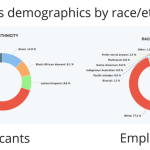The Recipe for Your Recruiting Success
May 3, 2016

You can’t cook without the right ingredients. Learn the recipe to recruiting success.
When Lewis Carroll penned Alice’s Adventures in Wonderland, he delighted readers with a surreal world of whimsy — and then frustrated them with nonsensical linguistic puzzles. One of the most aggravating comes from the Mad Hatter, when he asks Alice, “Why is a raven like a writing desk?” He never bothers to provide an answer. Carroll received scores of letters begging him to explain the riddle. Originally, it was meant to have no answer. In 1896 however, Carroll finally offered an (equally cryptic) interpretation: “Because it can produce a few notes, though they are very flat; and it is never put with the wrong end in front.” With that, I’d like to pose my own riddle to the audience. And there will be a less troublesome solution. So, how is a restaurant like recruiting?
Recipe for Success
Fans of the Food Network are surely aware of Chef Robert Irvine’s “Restaurant: Impossible.” The show is now in its thirteenth season, and Irvine has attempted to save nearly 140 failing eateries. His win rate stands at about 40 percent. That’s pretty amazing if you consider that each of the restaurants he approached had a 100-percent chance of imminent failure. Not only that, statistics show that 60 percent of most dining establishments don’t make it past their first year. Around 80 percent close in under five years. So Irvine clearly knows his stuff.
In a recent interview with Business Insider, Chef Irvine shared the key factors that determine whether a restaurant will boom or bust. What’s interesting is that most of these points reflect sound business practices that we can apply to our recruiting efforts. Therein lies the answer to the riddle. If you want to run a thriving recruitment agency, follow the advice Irvine gives to restaurateurs. Success is easier to achieve when you have the right recipe.
Every Detail Matters
A restaurant’s attention to detail is crucial to a favorable dining experience. That encompasses more than appearances. A cozy ambiance or trendy decor won’t impress diners if there’s no substance and function. Every detail informs a customer’s opinion.
- Are the floors and serving areas clean?
- Are the fixtures in good repair?
- Is the seating comfortable?
- Are the menus clear and easy to understand? Do they provide enough detail to make a good choice?
- Is the staff attentive, courteous, accommodating and professional?
- Does the food arrive promptly, and is it fresh?
- Was the order correct?
To create an exceptional experience for clients and candidates, recruiters should focus on the samelevel of detail.
- Be professional, engaging, responsive and attentive to the needs of your clients and candidates.
- Create compelling job descriptions that remain simple yet include all the details necessary to ensure an optimal match.
- Return calls, emails or social media communications promptly.
- Keep clients and candidates informed of progress at all times, through every stage of the hiring process.
- Ensure that the candidates submitted match the job profile. Just as diners sour over an incorrect order, clients and talent will become equally disappointed if the job or individual are blatantly incompatible. For instance, I’ve seen job seekers receive postings for nursing positions when they have no experience in the field. Why? Because the recruiters focused on a keyword. In this case, the worker had done marketing for a healthcare company.
- Communicate clearly and ensure that your interactions — whether digital or vocal — embody the brand you want to promote.
- Maintain your physical and virtual office spaces (e.g., social media, blogs, websites) so that they best represent your image. Everything should look updated, crisp, compelling, functional and tidy.
Financial Competency
As Irvine and Business Insider note in their article, “Even a restaurant with good food and loyal customers can tank if the owners don’t know how to manage money.” Chef Irvine cited an example of a restaurant owner who prided himself on strong returns with low food costs (overhead). However, when Irvine examined the financials, he discovered that the costs “were based on old figures and that the cost of ingredients had risen significantly since he last did his calculation.”For recruitment professionals, financial considerations should be just as imperative.
- Keep track of your operating costs, payroll, profits, losses, taxes, expenses and other overhead.
- Use a system, not just a spreadsheet. Accounting software doesn’t have to be expensive or complicated. Programs such as Quicken, QuickBooks or Sage can make a big difference.
- Determining a worker’s compensation and a markup isn’t giving you the entire picture of rates. Use a transparent and methodical approach. There are a lot of statutory costs involved in bill rates, beyond your marketing and profits. A wise plan is to determine all statutories before tacking on profits. These include FUTA, FICA, SUTA, taxes, employer mandated health, paid sick leave, disability and more. Bear in mind that these percentages vary by state and city.
- Create a database of all statutory costs for the regions you support. Make certain to update them at least once a year.
By understanding these costs, you achieve greater visibility into your revenues. A lot of agencies propose markups because they seem “standard.” However, before you submit your 38 percent markup, you’ll want to know precisely what that entails. Let’s say the statutory costs total 35 percent. That leaves just three percent to cover your general and administrative expenses, recruiting costs and profit.
Leadership
Nine times out of 10, Irvine says, restaurants operate more efficiently when the owners have worked their way up through the industry hierarchy. The same principle is relevant to recruiting. Your staff will respect and follow your vision when they have confidence in your experience, knowledge and skills. The best leaders put aside their egos and mentor their teams. They demonstrate a “buck stops here” attitude when issues arise. Today’s professionals want to develop. They want to advance, and they hunger to learn. Your firm will soar when your leaders are prepared to guide others by example.
Another critical element of strong leadership is passion. Creating a rich corporate culture stems from instilling shared values and a sense of belonging throughout the organization. Before Chef Irvine begins planning renovations and improvements to a restaurant, he spends time uncovering the commitment and passion of the owners. How far are they willing to go in order to make their businesses succeed?
As a recruitment leader, your team members must believe that they can conquer any obstacle, solve any challenge and deliver the best service possible. Candidates must sense that they are placing their career choices in the hands of experts — people who advocate for them and work tirelessly to find them an ideal position. Your emotional investment into the mission cements those attitudes and ultimately reflects the character of your firm. It’s also what attracts talent, staff and clients to your door.
Adaptability
In this fiercely competitive market, there is no industry immune to change. “A restaurant changes its look every two to three years in some way, shape, or form,” Irvine observes. “If you’re not willing to change based on what’s happening around you, you’ll never be successful.” These words ring just as true for recruiters.
Labor demands continue to change. The skills needed for today’s businesses have changed. A new, younger breed of talent has entered the workforce. Everything about workers and staffing is dynamic. Outpacing your competitors requires innovating new ways to discover, source, engage and connect with top talent.
Just as a restaurant, your recruiting business should continuously study industry trends — in recruiting and in the client sectors you serve. Watch for lulls and forecast evolving needs. Right now, for example, social recruiting strategies and passive candidate outreach are vibrant areas for hiring success. You should be examining and refining your methods, sources, systems and tools at least every two years to make sure that you’re adapting and remaining relevant.
Stand Out
What differentiates your favorite restaurant from another that serves the same fare? Everything, really. It’s the whole experience that matters. The cafes you frequent appeal to your tastes. The quality is exceptional, the prices are commensurate, the atmosphere is inviting and energizing, the service is exemplary and there’s a palpable sense of devotion and vigor — and that passion infuses the staff and patrons alike.
You can’t cook without the right ingredients. And those elements extend far beyond spices and food. Your favorite restaurant is most likely unique. Something about it stands out. Successful recruiters must also distinguish themselves from their competition. Without the best service, top talent, consistent delivery, operational stability, committed team members and a unique approach that guarantees performance, clients and candidates won’t consider what you have to offer.
Restaurants that try to be all things to all diners usually fail. Their message is muddled. Their menus are confusing. Their services are diluted. The best places know their niche. Strive to make what you have to offer unique. That doesn’t mean flashy or gimmicky. It involves creating a brand that embraces your values, capitalizes on your strengths, emphasizes your specialties and caters to a core base — the right people and the right business cultures.
Business & Finance Articles on Business 2 Community
(15)













